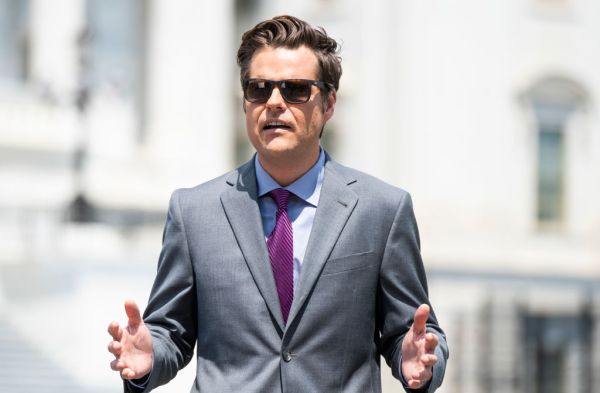Our friend David French put his finger on something in his new column that’s been bugging me since Election Day.
Conventional wisdom has it that voters revolted against left-wing cultural extremism by defeating Kamala Harris. Hyper-woke neologisms like “LatinX,” militant orthodoxy on transgender rights, “cancellation” crusades against anyone who defies progressive groupthink—it was all too much in the end. Freedom-loving Americans won’t stand for a political ethic of intolerance and bullying.
So they elected … Donald Trump?
David pondered the irony. “Every [illiberal] dysfunction you’ve seen on the far left has emerged on the far right, and the far right hasn’t been repudiated; it’s been empowered,” he wrote. Under our new president, he warned, “dissenting Americans should brace themselves for an assault on free speech, extreme intolerance and a vicious form of cancel culture that includes an avalanche of threats and intimidation.”
Of the two candidates on the ballot, it wasn’t Harris who vowed during the campaign to use the executive branch as a weapon for “retribution” against her enemies. On the contrary, she tried harder than Trump did to distance herself from the most illiberal elements of her base, leading David to pose this haunting question: “If Americans hate intolerance and bullying, why did a critical mass of Americans vote against the party that was moving away from its extremes?”
His theories range from depressing to sinister. But it’s important to have a theory, as where you land on his question will influence how you answer another important question we’ll face over the next four years: What’s the least destructive approach Trump might potentially take to subverting liberal norms? Would he do less damage by insisting on a patina of constitutional legitimacy for his power grabs or by running headlong at constitutional constraints and behaving like a true autocrat?
Let me give you two scenarios.
Scenario one: Facing dug-in resistance to confirming Matt Gaetz—er, I mean Ken Paxton—as attorney general, Trump dials up reluctant Senate Republicans and threatens to back primary challengers in their next races with even more enthusiasm than he did in getting Liz Cheney ousted from the House if they vote no. Behind the scenes, he encourages right-wing propaganda outlets to dub the Senate holdouts “traitors” and “enemies of the people,” triggering the avalanche of threats that David predicted. Maybe he quietly persuades some ambitious deputy at the DOJ to open criminal investigations into those members’ business dealings to apply a bit more pressure.
Frightened, the Senate holdouts eventually agree to a “compromise” with the White House. Rather than confirm Paxton, they’ll support a motion to adjourn Congress for a few weeks so that Trump can recess-appoint him.
All of that would be within the letter of the Constitution, even though Trump’s illiberal tactics would grossly contradict its liberal spirit. Paxton’s confirmation would carry a patina of legitimacy insofar as Trump had, technically speaking, followed the rules.
Scenario two: Facing dug-in resistance to confirming Ken Paxton as attorney general, Trump declares that the dire corruption of the Justice Department and his paper-thin popular “mandate” for radical reform requires him to put Paxton in charge whether or not the Senate agrees. Paxton’s appointment ends up being challenged and the Supreme Court declares it unconstitutional, prompting Trump to invite John Roberts to come on down to the DOJ and physically remove Paxton from the premises himself. When the court signals that it won’t recognize the validity of Justice Department actions so long as Paxton remains in command, Trump dares it to start nullifying those actions en masse and grind the federal government to a halt. How many criminals is Roberts prepared to free in order to win this test of wills? How much personal security is he willing to put up with to protect himself from feral Trump supporters?
At some point Paxton pulls Trump aside and explains to him what judicial review is, pointing out that it’s a judge-made doctrine with no textual basis in the Constitution. That leads Trump to declare that he no longer recognizes the court’s authority over Article II and that, henceforth, the president himself will be the ultimate arbiter of whether executive actions are constitutional.
That would be pure autocracy, taking a battering ram to the rule of law in the belief that the freedom-loving American people would side with the autocrat in the ensuing crisis.
Which approach is worse for the country long-term? The answer is more complicated than one might think.
Controlled blazes and raging infernos.
Whether you prefer the controlled blaze of Trump acting with a veneer of legitimacy or the raging inferno of Trump lighting the constitutional order on fire depends to some degree on how much faith you have in Americans.
David French wrestled with that in his column. The “innocent” explanation for why voters preferred the very illiberal Trump to the less illiberal Harris, he surmised, is as potentially simple as inflation being high and the border being porous. Illiberalism may have had nothing to do with it. Ditto for the various polls throughout the campaign that showed Trump performing much better with Americans who don’t follow political news than with those who do. The voters who decided the race haven’t turned against liberalism, perhaps. They just weren’t paying attention.
If that’s true then the country might be better off on balance if Trump continues to work within liberal norms towards illiberal ends.
He’ll be gone someday, you know, and it would be nice if those norms remained formally intact and ripe for revival once he is. No one wants to see the Constitution mocked in the way I described in my first scenario, but that outcome would at least have the virtue of all sides agreeing that presidents can’t make Cabinet appointments without some form of cooperation by the Senate. That may be important someday in the future when a lesser demagogue like J.D. Vance decides to try his hand at scenario two.
Precedents matter. The lip service paid to separation of powers and checks and balances today could deter more aggressive attempts to challenge the constitutional order tomorrow. Like I said yesterday, the more radically Trump succeeds in remaking government to serve his interests, the more radically he and his party will resist handing over control of the government after Democrats’ next electoral victory. The metaphor of a raging inferno is deliberate: If Trump burns down the norm against appointing unconfirmed Cabinet nominees and turns the executive branch into a revenge machine, the “anything goes” logic of his power play will spread. Preserving the norm, even superficially, might serve as a fire break.
There’s another reason to want to protect formal liberal norms as Trump goes about undermining them in practice. I quote David again: Liberalism, he writes, is “a learned behavior, modeled by leaders, and when leaders stop modeling tolerance and decency, Americans are prone to backslide to fear and animosity.” That’s especially true for the youngest voters, who have never known right-wing leadership that didn’t evince contempt for the constitutional order. The only political model they have for their conservative tendencies is Trump.
He won 43 percent of the 18-29 age group this year, up from 36 percent four years ago. A new poll from The Economist finds his favorable rating among the same group at 57-38, easily his best numbers among four different age demographics. Everything he does in office for the next four years will be a lesson to America’s youngest adults on how a president should behave. It would be better for the leaders of tomorrow if that lesson involved formally abiding by liberal norms than contemptuously nuking them outright.
All told, I think we should prefer to see Trump seek a patina of constitutional legitimacy for his abuses of power if we believe that America’s civic conscience is dormant or distracted but still generally robust. In that case, we might not need to risk him taking the dire, destructive step of smashing constitutional norms to wake it up. A comparatively gentle nudge—like pressuring the Senate to adjourn—could be enough to rouse it.
But what if we think America’s civic conscience is dying, not napping?
David, a man not normally as pessimistic as certain Dispatch writers, sounds open to that possibility too. “America possesses a unique culture, but it does not possess a unique people,” he observed. Maybe voters preferred the more illiberal option on the ballot this year because human beings are illiberal at heart and will act accordingly if the culture of liberalism in which they’ve grown up degrades beyond a certain point. Our country may at last have reached that point. “Americans don’t hate cancel culture in the abstract,” David wisely noted. “They hate being canceled.”
That’s postliberalism in a 12-word nutshell. It wasn’t the “bullying” part of progressive bullying that offended Trump voters on Election Day. It was the “progressive” part.
If Americans’ civic conscience is dying, not napping, then nothing short of a major defibrillating shock will be enough to revive it. The first scenario I laid out earlier won’t cut it, as the patina of legitimacy Trump would gain by following the letter of the law would provide illiberal right-wingers with the fig leaf they need to justify his assault on congressional power. The millions of frogs who voted for him earlier this month have been slowly boiling for nearly 10 years; if he turns up the civic temperature another 5 degrees, they won’t notice.
But if he turns up the temperature 500 degrees a la my second scenario, starting a raging inferno by ignoring the Supreme Court and declaring himself supreme monarch of the executive branch? That might cause some to finally hop out of the pot. A country capable of mounting a backlash to wokeness logically should be capable of mounting a backlash to anti-wokeness when sufficiently provoked. If anything’s going to provide a much-needed jolt to a dying civic conscience, a brazen norm-smashing autocratic power play might be it.
Of course, four years ago I would have said the same thing about a presidential coup attempt. And here we are.
Which brings me to another virtue of Trump dispensing with constitutional niceties and attacking the rule of law head-on—namely, moral clarity. If Americans are going to sit by while the liberal order is dismantled, I’d prefer that they not be allowed to hide behind the excuse that, ackshually, what’s happening is technically legal and therefore supposedly would make George Washington beam with pride until his false teeth fell out. As a moral matter, Trump’s voters should be forced to reckon honestly with what they’re condoning.
If we’re going to end the American experiment, let’s end it forthrightly instead of wallpapering Mar-a-Lago with the Constitution. It’s bad enough that fascism should prevail; the least we can do to avenge the Founders is not let it parade around in patriotic Enlightenment finery. James Madison deserves better than to be used as a human shield by Mussolini.
Picking one’s spots.
The easy yet probably correct prediction is that Trump will alternate situationally between the two scenarios I’ve described depending on how politically invested he is in a given outcome.
Matt Gaetz’s withdrawal as attorney general nominee on Thursday was encouraging inasmuch as it saw Trump yield to Senate prerogatives, but we shouldn’t read much into it given that the battle was relatively low stakes. Gaetz is freakishly unlikable, after all, and his alleged sexual peccadilloes were becoming more embarrassing by the hour. And ultimately Trump didn’t need him: There are thousands of smart, amoral, legally trained populist toadies out there who’ll happily wreck the Justice Department for him if given the opportunity, starting with Ken Paxton. Had the president sought to appoint Gaetz over opposition from the Senate and Supreme Court, one could easily imagine puzzled Americans wondering: All this fuss for this goblin?
The political juice for the president-elect wasn’t worth the squeeze of a ruthless power grab to get Gaetz installed. If the Senate starts feeling its oats and looks to bork Trump’s next AG nominee and/or MAGA darlings like Tulsi Gabbard and Robert F. Kennedy Jr., maybe that will finally trigger the first scenario I laid out. But scenario one will be reserved for battles where Trump can accept the risk of a temporary setback because he knows there’s some acceptable alternative like Ken Paxton waiting in reserve.
Scenario two will be reserved for the big stuff where he can’t accept that risk.
I do think we’ll see him try some truly hair-raising autocratic power grab at some point in his presidency, probably if the Senate or the Supreme Court gets in his way on a top priority like mass deportation or purging the military of anyone inclined to refuse an illegal order. No one, I suspect, grasps David French’s point more keenly than Trump that American voters seem to have a higher tolerance for right-wing illiberalism than left-wing illiberalism. He’s going to test that tolerance. I’d bet anything that he believes he has a mandate to do so.
And I’d bet not quite everything but rather a lot that, with respect to most of his voters, he’s right.
So we end by repeating a point I made yesterday: There’s only so much the Constitution can do to restrain a president who’s determined to avoid its restraints and who has the support of half the population in doing so. Whether out of apathy toward illiberalism or enthusiasm for it, Americans chose a leader whom they had reason to know will govern by fear and by favor, not by law. When, not if, Trump chooses scenario two and defends his power grab as a legitimate expression of popular will, it will be hard to argue.







Please note that we at The Dispatch hold ourselves, our work, and our commenters to a higher standard than other places on the internet. We welcome comments that foster genuine debate or discussion—including comments critical of us or our work—but responses that include ad hominem attacks on fellow Dispatch members or are intended to stoke fear and anger may be moderated.
With your membership, you only have the ability to comment on The Morning Dispatch articles. Consider upgrading to join the conversation everywhere.